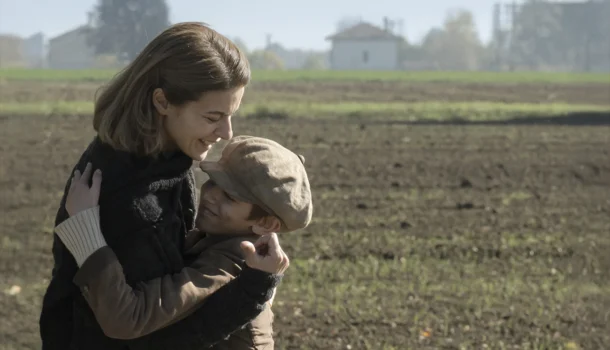Throughout history, armed conflicts have forced countless families to make unimaginable decisions to protect their children. One of the most striking consequences of these crises has been the relocation of children to new homes, often in distant regions, in an attempt to shield them from the horrors of war. Among the most emblematic examples, Operation Pied Piper, carried out in the United Kingdom during World War II, moved children from vulnerable urban areas to the countryside. Similarly, the so-called “children’s trains” transported young Jewish refugees out of Nazi persecution zones, offering them a chance to survive amidst the chaos.
Within this context of forced displacements, cinema revisits stories of childhoods abruptly transformed by brutal circumstances. Based on real events, the film sheds light on a little-remembered chapter of post-war Italy, when children from the devastated south were sent north, where they found shelter and new opportunities in unfamiliar families. Economic devastation, the absence of fathers lost in combat, and the solitary struggle of mothers left a trail of hardship that led to this bold humanitarian initiative.
At the heart of the narrative is Amerigo Speranza (Christian Cervone), a seven-year-old boy living in Naples with his mother, Antonietta (Serena Rossi). The harsh reality of his childhood is marked by scarcity and small acts of mischief that make his days slightly more bearable. Antonietta’s decision to send him north, where he is expected to have better living conditions, is driven by both necessity and despair. Thus, Amerigo embarks on this journey, orchestrated by the Italian Communist Party and the Unione Donne Italiane (UDI), which sought to alleviate the suffering of the most vulnerable children.
In this new environment, he is welcomed by Derna (Bárbara Ronchi), a single woman with no children, whose demeanor starkly contrasts with the maternal figure Amerigo has known. While Antonietta embodies silent resilience and the hardships of survival, Derna offers an entirely different world: unconditional affection, plentiful food, and the opportunity to discover an unexpected talent for music as he learns to play the violin. Between farm work and carefree play, Amerigo experiences a life he could never have imagined in Naples.
Although his new reality provides him with a less harsh existence, the longing for his mother never fades. The letters exchanged between them reveal a bond that time and distance cannot erase. His return to the south, therefore, should be a triumphant reunion, a moment of sharing and joy. However, the cold reception from Antonietta exposes the irreparable divide between the two worlds Amerigo now carries within himself. The boy who left is no longer the same as the one who returns, and his mother, upon realizing this, faces an uncomfortable truth: she cannot offer her son the completeness he experienced elsewhere.
The film’s emotional depth is heightened by the performances of Rossi and Ronchi, whose dedication brings to life the complex emotional nuances of the story. With an atmosphere reminiscent of the melancholy of “Cinema Paradiso”, the narrative unfolds to the sounds of a score composed by Nicola Piovani, an Academy Award-winning talent. Despite its impactful story, “The Children’s Train” was not selected to represent Italy at the 2025 Oscars, a decision that may limit its international recognition. Nevertheless, its narrative strength and humanistic perspective establish it as one of the most memorable productions of the year.
Film: The Children’s Train
Director: Cristina Comencini
Year: 2024
Genres: Drama
Rating: 10

